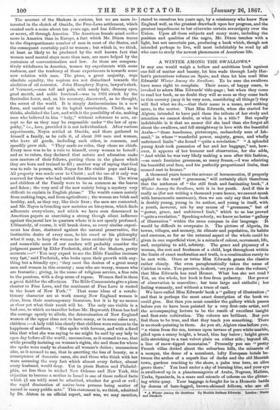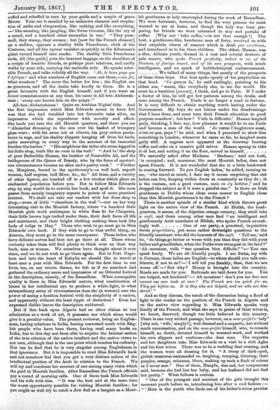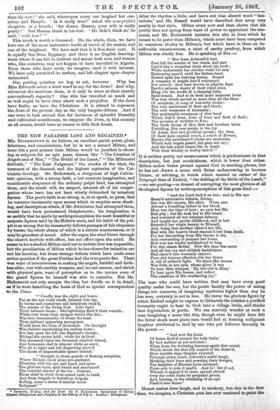A WINTER AMONG THE SWALLOWS.* IF any one would weigh
a hollow and ambitious book against one full of matter and beauty, let him wade through Lady Her- bert's pretentious volume on Spain, and then let him read Miss Edwards' Winter Among the Swallows. To be sure the swallows have some right to complain. Their name, of happy omen, is invoked to adorn Miss Edwards' title-page ; but when they come to read her book, as no doubt they will so soon as they come back to this country (may it be very soon, considering all things !) they will find what we do,—that their name is a name, and nothing more, in the matter. That Miss Edwards, when she started for Algiers, intended to have paid them the tribute of her study and attention we cannot doubt, or what is in a title ? But equally indubitable is it that no sooner did she land than she forgot all about the swallows, and fell straightway in love with the beautiful Arabs—" those handsome, picturesque, melancholy sons of Ish- mael," in whose " wonderful power, majesty, grace, and wholly unfettered limbs" she found " quite a revelation." " A splendid young Arab took possession of her and her baggage," not, how- ever, it appears of her humour and observation, for she adds, "And whilst he was very likely making a sum after this fashion, —so much feminine greenness, so many francs,—I was admiring his beautiful oval face, and his perfectly proportioned limbs, that seemed cast in bronze."
A thousand years hence the science of hermeneutics, if properly applied to the word " greenness," will certainly elicit therefrom that the authoress of " the still fresh and fascinating book," A Winter Among the Swallows, writ it in her youth. And if this is really so (for not writing a thousand years hence, we cannot speak with hermeneutic assurance), then we can only say that the book is doubly young, young in its author, and young in itself, with a youth, however, • not by any means of " greenness," but of "power, grace, and unfettered limb," which to us has proved "quite a revelation." Speaking soberly, we know no better" gallery of illustration" within the same compass in our "language. It would be difficult to overpraise it. The picture of Algeria, its towns, villages, and scenery, its climate and population, its habits and customs, so far as the external aspect of the whole could be given in one superficial view, is a miracle of colour, movement, life, and, surprising to add, sobriety. The grace and piquancy of a woman, the zest and freshness of a child, kept throughout within the limits of exact moderation and truth, is a combination rarely to be met with. Once or twice Miss Edwards grazes the classics rather closely. She even paraphrastically takes the name of Calchas in vain. You perceive, in short, 6ere you close the volume,' that Miss Edwards has read Homer. What has she not read ? Yet, on the whole, her book is free from pedantry. Her power of observation is masculine ; her tone large and catholic; her feeling womanly, and without a trace of cant.
We have called Miss Edwards' book a" gallery of illustration ;" and that is perhaps the most exact description of the book we could give.. But then you must consider the gallery which passes before you to have been painted by a very first-rate artist, and the accompanying lecture to be the result of excellent insight and first-rate cultivation. The colours are brilliant. But you feel them to be trae, and that they teach you something. There is no stock-painting in them. As you sit, Algiers rises before you, "a vision from the sea, terrace upon terrace of pure white marble, piled upon a sunny height, a broad, blue bay below ; bright green hills stretching to a vast velvet plain on either side ; beyond all, a line of snow-tipped mountains." Presently you see " pretty French villas dotted about the suburban hills, the minarets of a mosque, the dome of a marabout, lofty European hotels be- tween the arches of a superb line of docks and the old Moorish town, gardens reaching to the shore, a palm tree here, an olive groire there.' You land under a sky of burning blue, and your eye is swallowed up in a phantasmagoria of Arabs, Negroes, Maltese, Turks, Spaniards, in a maze and miracle of colours on the glitter- ing white quay. Your baggage is fought for in a Homeric battle by dozens of bare-legged, brown-skinned fellows, who are all
A Winter Among the Swallows. By Matilda Betham Edwards. London: Hurst and Blacken.
cuffed and rebuffed in turn by your guide and a couple of grave Moors. Your ear is assailed by an unknown clamour and crepita- tion of oaths and vituperation, like nothing and like everything, —' like sneezing, like jangling, like Swiss German, like the cry of a camel, and a hundred other anomalies in one.' "They pum- mel], they stamp, they scream ; but [now for the French element] on a sudden, appears a shabby little Frenchman, clerk of the Customs, and all the uproar vanishes as quickly as the fisherman's giant turned himself into smoke. The shabby little Frenchman nods, Ali [the guide] puts the heaviest luggage on the shoulders of a couple of humble friends, or perhaps poor relations, and coolly walks by your side, carrying the umbrella only. He speaks toler- able French, and talks volubly all the way. 'Alt, le beau pays que l'Afrique! and what numbers of English coins out there,---ma foi, what numbers !' The more the better for him ; the English are so generous, and all the Arabs take kindly to them. He is a great favourite with the English himself, and if you want an honest commissionaire at any time, his name is Ali-ben-Abdarrah- man ; every one knows him on the quays."
Ali-ben-Abdarrahman ! Quite an Arabian Nights' title. And the first impression which Miss Edwards seems to have felt was that she had tumbled into her favourite tales alive, an impression which she reproduces with novelty and effect. She leads you into the old Moorish quarters, and there you see " Alnaschar dreaming in the sun over his basket of trumpery glass ware ; with his arms out at elbows, his grey cotton panta- loons in rags, and his shabby slippers hanging off from his heels, quite answering in every way to the account of his immortal brother the barber." "His neighbour the tailor sits cross-legged in his little shop, built like an oven in the wall." " And lo! the shop of poor Bedreddin Hassan, the brother of Noureddin Ali, and the bridegroom of the Queen of Beauty, who by the force of mysteri- ous circumstances became an alien and a pastry-cook." " Further on, Morgiana, bound to the apothecary's—a well knit, superb woman, half negress, half Moor, &c., &c." All these, and a variety of other figures, are touched off in a few strokes which place an enchanted population before you. But to follow Miss Edwards step by step would be to rewrite her book, and spoil it. She soon passes from merely imaginary aspects to points of more practical interest. We shall not take our readers with her from shop to shop,—rows of little " chambers in the wall "—nor on her very interesting visit to the Moorish factory, where " a hundred little Moorish girls work arabesques in white floss fit for Cleopatra, their little brown legs tucked under them, their dark faces all life and merriment, and their bright clothing making them look like beds of tulips in May." Those who wish to go must go in Miss Edwards' own book. If they wish to go to that awful thing, an Aissoua, they must go in the same conveyance. Those ladies who have delicate nerves had best not go there at all. Those whose curiosity takes them will find plenty to think over on their way back, man or woman. We ourselves have thought about it ever since, and we do not wish to go there again. But to Fort Napo- leon and into the heart of Kabylia we should like to travel at least once a year with Miss Edwards. For the first time in our lives, too, on our return thence, we felt as if we somehow had gathered the ordinary sense and impression of an Oriental festival in the description, namely, of the Ramadhan. What cosmopolite quality is there in Miss Edwards' nature, what combination of lenses in her intellectual eye to produce a white light, to what extraordinary array of circumstances does she (a woman) owe the power of seeing a heathen festival with the simplicity of a native, and apparently without the least ripple of distortion ? Even her expressed dislike leaves the description unblurred.
But if this book upon Algeria had no other claims- to our admiration as a work of art, it possesses one which alone would give it a peculiar value. The present reviewer, being an English- man, having relations in India, having conversed much with Eng- lish people who have been there, having read many books on India, has to this day not been able to acquire the faintest notion of the true relation of the native intellect and the native views to our own, although that is the one point which touches his curiosity.
Nor can he find that he is very singular among Englishmen in that ignorance. But it is impossible to read Miss Edward's book and not somehow feel that you get a very distinct notion of the intellectual position of the Arab in relation to the French. We will try and condense her account of one among many visits which she paid to Moorish families. After Ramadhan the French officials pay a round of morning calls. One of them took Miss Edwards and his wife with him. " It was the best and at the same time the worst opportunity possible for visiting Moorish families ; for you might as well try to catch a Jew dull at a bargain as a Moor- ish gentleman or lady unoccupied during the week of Ramadhan. We were fortunate, however, to find the very persons we most wanted to see at home, and though the lady was busy pre- paring for friends we were entreated to stay and partake of coffee. [Why not take coffee,'—is not that enough ?] The host, a gentleman-like, handsome man of forty, received us with that exquisite charm of manner which is Arab par excellence, and introduced us to his three children. The eldest, Hassan, was a slim, delicate youth, dressed in a vest and several drawers of pale mauve, who spoke French perfectly, talked to me of the Fenians, of foreign travel, and of his own prospects, with much intelligence, and no spark of hobbledehoyish embarrassment.
We talked of many things, but mostly of the prospects. of these three boys. Our host spoke openly of his perplexities on that head. ' Ce garcon la,' he said smilingly, pointing to his eldest son, ' wants, like everybody else, to see the world. He must be a barrister [avocat], I think, and go to Paris. If I make a doctor of him, he will get few patients among the Arabs, and none among the French. Trade is no longer a road to fortune. It is very difficult to obtain anything worth having under the Government. My boys do not labour under the disadvantage that I have done, and must turn their French education to good purpose somehow ; but how ? Voila la diffieulte.' Hassan laughed gaily, thinking, I dare say, how pleasant it would be to see Paris and become a man of the world. Je verrai l'Angleterre aussi, n'est-ce-pas, papa ? ' he said, and when I promised to show him something in London, whenever he came so far, he laughed more gaily still. A negress now appeared at the doorway bearing coffee and cake on a massive gold salver. Hassan sprang to take
it of her, and setting it on the floor, served us himself We naturally asked after Madame. Madame,' said our host, is occupied ; and, moreover, like most Moorish ladies, does not speak French. It is not wonderful that she is a little backward in coming forward. To you English ladies,' he added, turning to me, ' who travel so much, I dare say it seems surprising that our ladies can live, keeping within doors as constantly as they do ; it is the custom, not a good custom, mais on s'y habitue ;' and he dropped the subject as if it were a painful one." Is there an Irish. gentleman in Dublin whose ideas come nearer to English ideas than this Moorish gentleman's to the French ?
There is another episode of a similar kind which throws great light on the native view of the French. At Blidah, the head- quarters, it seems, of the Algerian orange country, they stroll into a cafe, and there among other men find " an intelligent and gentlemanly Arab merchant of Blidah, who spoke French exceed- ingly well One of our party, a practical, inquisitive Swiss proprietaire, put some rather downright questions to the friendly merchant who did the honours of the café. Tell me,' said he, do things go better or worse with you than they did with your father and grandfather, when the Turks were strongest in the land ?' ‘Ah monsieur, voila " une question bien difficile !"—' You can. speak freely. We are all friendly people. I am Swiss, my wife is German, those ladies are English—to whom should you talk con- fidence, if not to us?'—' I will tell you frankly, then, that we are worse off.'—' But why? Money is brought into the country.
Roads are made for you. Railroads are laid down for you. You are helped, not hindered Ah monsieur ! don't you see that men cannot use new tools at once? The French are too quick for us- They get before us. It is they who are helped, and we who are hin- dered.' " And so they discuss, the result of the discussion being a flood of light to the reader on the position of the French in Algeria and on the native view regarding it. Miss Edwards speaks very kindly of the French, and what she says in praise of their wives is, we know, deserved, though too little believed in this country. There is one very wicked passage, however, on a sous-prefet's lady' [why not, ' wife,' simply?], well dressed and a coquette, but without much conversation, and on the sous-prefet himself, who, to console himself, no doubt, devoted himself to worsted-work, and worked his own slippers and cushions—the dear man. The coquette and her daughters take Miss Edwards on a visit to a rich Agha and his four wives. There was to be a wedding that evening, and the women were all dressing for it. " A troop of dark-eyed, girlish creatures surrounded us, laughing, romping, tittering, their purples, orange, crimsons, blues, making up such a flush of colour as I never saw." One of them, Hanyfa, was sad, her companions said, because she had lost her baby, and her huhband did not find her pretty." What follows is curious.
" One of the youngest and merriest of the girls brought this recreant youth before us, introducing him after a cool fashion :-- " Here is the youth who finds one of his father's wives prettier than his own ! ' she said, whereupon every one laughed but our-
selves and Hanyfa. Is it really true?' asked the sous-prefet's daughter, in a breath ; for shame, Hassan, your wife is really pretty ! ' But Hassan stuck to his text. ' lie didn't think so,' he said, voila tout ! ' " This touch is worth a thousand. On the whole, then, we have here one of the most instructive books of travel of the season, and one of the brightest. We have said that it is free from cant. It is equally free from flippancy, and there is no English drawing- room where it can fail to instruct and amuse both men and women who, like ourselves, may not happen to have travelled in Algeria. Even those who have must, we imagine, read it with interest. We have only scratched its surface, and left chapter upon chapter untouched.
One parting question we beg to ask, however. Why has Miss Edwards never a kind word to say for the Jews ? And why, whenever she mentions them, is it only to sneer at their (surely conventional) rapacity? One who has travelled so much and so well ought to have risen above such a prejudice. If the Jews have faults, so have the Christians. It is absurd to represent the Jews of the present day as the only bargain-drivers. And if cne were to look around him for instances of splendid liberality and cultivated munificence, we suppose the Jews, in this country at all events, would have no reason to hide their heads.
































 Previous page
Previous page